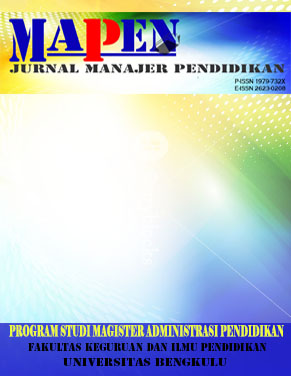Main Article Content
Abstract
The purpose of the study was to describe the implementation of the Smart Indonesia Program (PIP) at the 41 Rejang Lebong State Elementary School.
This research method uses a qualitative descriptive approach. The research subjects were the Operators of the Rejang Lebong District Education Office, the Principal and Operator of the 41 Rejang Lebong State Elementary School, parents and students who received PIP. Data were collected through observation, interviews and documentation methods. The data were analyzed by means of data reduction, data presentation and drawing conclusions. The results showed that the mechanism for inputting data for underprivileged students had been carried out according to the requirements, but not all students who met the criteria for obtaining PIP funds so that the utilization of PIP funds for equal distribution of education in 41 Rejang Lebong Elementary School was less than optimal.
This research method uses a qualitative descriptive approach. The research subjects were the Operators of the Rejang Lebong District Education Office, the Principal and Operator of the 41 Rejang Lebong State Elementary School, parents and students who received PIP. Data were collected through observation, interviews and documentation methods. The data were analyzed by means of data reduction, data presentation and drawing conclusions. The results showed that the mechanism for inputting data for underprivileged students had been carried out according to the requirements, but not all students who met the criteria for obtaining PIP funds so that the utilization of PIP funds for equal distribution of education in 41 Rejang Lebong Elementary School was less than optimal.
Article Details
License
Copyright (c) 2023 Firman Hamri

This work is licensed under a Creative Commons Attribution-ShareAlike 4.0 International License.

Manajer Pendidikan by https://ejournal.unib.ac.id/index.php/manajerpendidikan/ is licensed under a Creative Commons Attribution-ShareAlike 4.0 International License.
